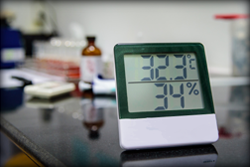|
Having trouble viewing this email? View it as a Web page.


Reduce Indoor Allergens This Spring: Tips for a Healthier Indoor Environment
Allergy triggers, or allergens, can be found on surfaces and in the air in your home.
|
Get Busy This Spring With Practical Tips to Control Allergens Indoors
-
Limit the amount of allergens that enter your home.
- Use doormats to help trap allergens before they enter the home. Clean doormats frequently.
- Consider removing shoes after entering the home.
- Change heating, ventilation and air conditioning (HVAC) system and air cleaner filters on schedule (see the manufacturer’s instructions).
- Do not smoke indoors.
-
Reduce allergens that are produced or can develop indoors.
- Dry wet items quickly. Prevent mold growth from water spills or leaks by acting quickly when home furnishings or other items get wet. Usually mold won’t grow if items are dried within 24–48 hours. Make sure to fix any leaks promptly as well.
- Dust often. Vacuum and wash bedding weekly. House dust mites, animal dander and other allergy-causing agents can be reduced, although not completely eliminated, through regular cleaning.
-
Control indoor humidity to help prevent the growth of mold and other organisms.
- Use kitchen exhaust fans when cooking. Exhaust fans should be vented to the outdoors.
|
- Use bathroom exhaust fans or open the window when showering.
- Consider using air conditioners or dehumidifiers as needed to help control indoor humidity. Air conditioners reduce humidity as they cool the air.
|
Did you know?
You can measure the humidity at home with a small, inexpensive moisture or humidity meter, available at many hardware stores.
Try to keep indoor humidity below
60 percent and ideally between
30 and 50 percent.

|
- If using a humidifier or dehumidifier, routinely empty the water and clean the unit according to the manufacturer’s instructions to prevent mold and bacteria from growing or getting into the air.
- Clean window-unit air conditioner drip pans routinely, and replace filters per the manufacturer’s recommendations.
|
|



